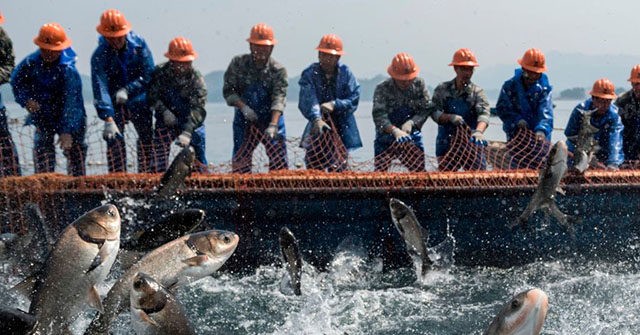Lawmakers in Kenya are planning legislation to ban companies from importing fish from China, the country’s Daily Nation reported Tuesday, after years of controversy involving exploitation of natural resources and reports of Beijing selling the African country poisoned fish.
Silas Tiren, the head of the Kenyan National Assembly’s Committee on Agriculture — which controls fisheries policy — told the Nation that Kenya’s fish reserves are too rich for a need to import from abroad, forcing local fishermen to compete with much larger corporate entities.
“I don’t see why we should import from China when we have enough fish in the country. There is a lot of potential in our waters, we must capture it,” Tiren reportedly said. The lawmaker accused China, and other unnamed foreign countries, of “fishing from our waters and later selling to us,” damaging the ability of local fishermen to sustain their families.
China and Kenya, under current President Uhuru Kenyatta, have greatly expanded their economic ties. Kenya is a partner in China’s Belt and Road Initiative (BRI), a global infrastructure program in which China offers developing countries predatory loans that they later cannot pay, forcing the country to forfeit key assets like ports and railways. Kenya has also historically allowed a significant amount of tilapia imports to enter its market even as it counts on some of the richest maritime reserves in the world, including a coast on the Indian Ocean and Lake Victoria, the largest on the continent of Africa.
The flagship BRI project in Kenya is the Standard Gauge Railway (SGR), built to connect Nairobi to several other regional capitals. The project attracted national outrage for a variety of reasons: the provisions of the contract, and the loan to build the railway, are secret; China flooded the country with Chinese workers rather than hiring local laborers; and the few Kenyans on the job complained of “apartheid” policies on work sites like keeping black Kenyan workers from eating meals at the same tables as Han Chinese workers.
China also reportedly flooded Kenya’s immigration system with illegal workers who filed for much easier to obtain tourist visas and spent the entire time before their expiration working jobs initially promised to Kenyans.
Most of the SGR was reportedly up and running by 2019, but questions remain as to its ability to generate funding for the government to compensate for the presumably prodigious loan Kenya took out to afford hiring Chinese companies to build it.
The issue of China flooding Kenya with cheap fish imports, pricing local fishermen out of the market, is separate from concerns over BRI projects but similar in that critics have complained contracts and licenses to allow foreign ships to exploit Kenyan waters are secretive and prevent journalists and others from fully understanding to what extent those fishing in Kenyan waters are actually Kenyan. The lawmakers speaking to the Nation asserted that banning imports from China alone would go far in making the fish consumption market more amenable to local anglers.
“We have enough fish in Kenya. We must protect our fishermen. We shall call upon fisherfolk so that they can give us their ideas about the efficiency and effectiveness of the applications of the Kenya fisheries laws,” John Mutunga, a Kenyan lawmaker, told the outlet.
Limiting imports from China would not fully empower Kenyan fishermen, the Nation observed, because many do not have access to the technology necessary to fish in deeper waters with richer fish stocks. It would, however, address another problem the Nation uncovered in a study it commissioned in February 2020: China selling Kenyans poisoned fish, particularly tilapia. The Nation sent a box of imported fish to the University of Nairobi for study at the time, which found toxic amounts of at least seven pesticides laced in the fish meat that “can cause cancer, mouth ulceration, dysphagia, and abdominal pain, among other diseases.”
The fish also tested for 427 times the amount of lead that the World Health Organization (W.H.O.) considers appropriate for human consumption. University of Nairobi scientists concluded that the fish was not safe to eat.
The Kenyan government did not act in the face of the Nation report, allowing China to continue selling tons of potentially toxic fish to Kenyan citizens at the expense of Kenyan fishermen. The study did not specify if the fish tested came from Kenyan waters.
Prior to reports of a ban on Chinese fish imports on Tuesday, the Nation revealed Monday that tracking just how many foreign vessels were exploiting Kenyan waters was near impossible in part because the government stopped paying the French company it hired to track these ships.
“Kenya’s foreign fishing licensing has always been shrouded in secrecy,” the newspaper noted, “with efforts by the Nation to get a look at the number of vessels permitted by the government into the fishing zone thwarted several times by the Fisheries department and senior maritime officials.”





